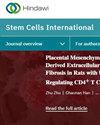欧库宾通过lncRNA-H19驱动的Wnt/β-Catenin信号调控轴促进成骨分化并促进骨形成
IF 3.3
3区 医学
Q2 CELL & TISSUE ENGINEERING
引用次数: 0
摘要
目的。中药杜仲用于治疗骨折已有数百年历史,对骨折愈合有显著改善作用。杜仲甙是从杜仲中分离出来的一种衍生物,已被证实具有抗炎、免疫调节和抗氧化潜力。在本研究中,我们的目的是探索其在骨再生中的功能,并阐明其潜在机制。材料和方法。研究人员分别在小鼠骨髓间充质干细胞(BM-MSCs)和 RAW 264.7 细胞中检测了杜鹃素对成骨细胞和破骨细胞的影响。此外,还通过qPCR检查、Western印迹和荧光素酶活性测定检测了lncRNA H19和Wnt/β-catenin信号转导。利用股骨骨折小鼠模型,通过X射线、显微CT、组织形态计量学和免疫组化染色等方法检测了杜仲苷对体内骨形成的影响。研究结果本研究发现,杜鹃素能显著促进体外成骨分化和体内骨形成。关于其潜在机制,研究发现澳库宾可明显上调间充质干细胞中的H19,从而诱导Wnt/β-catenin信号的激活。此外,H19的敲除部分逆转了Aucubin诱导的成骨分化,并成功抑制了Wnt/β-catenin信号的激活。因此,我们认为 Aucubin 通过促进 H19 的表达诱导了 Wnt/β-catenin 信号的激活。结论我们的研究结果表明,澳库宾通过H19-Wnt/β-catenin调控轴促进体外成骨,并促进体内骨折愈合。本文章由计算机程序翻译,如有差异,请以英文原文为准。
Aucubin Promotes Osteogenic Differentiation and Facilitates Bone Formation through the lncRNA-H19 Driven Wnt/β-Catenin Signaling Regulatory Axis
Objectives. Traditional Chinese medicine Cortex Eucommiae has been used to treat bone fracture for hundreds of years, which exerts a significant improvement in fracture healing. Aucubin, a derivative isolated from Cortex Eucommiae, has been demonstrated to possess anti-inflammatory, immunoregulatory, and antioxidative potential. In the present study, our aim was to explore its function in bone regeneration and elucidate the underlying mechanism. Materials and Methods. The effects of Aucubin on osteoblast and osteoclast were examined in mouse bone marrow-derived mesenchymal stem cells (BM-MSCs) and RAW 264.7 cells, respectively. Moreover, the lncRNA H19 and Wnt/β-catenin signaling were detected by qPCR examination, western blotting, and luciferase activity assays. Using the femur fracture mice model, the in vivo effect of Aucubin on bone formation was monitored by X-ray, micro-CT, histomorphometry, and immunohistochemistry staining. Results. In the present study, Aucubin was found to significantly promote osteogenic differentiation in vitro and stimulated bone formation in vivo. Regarding to the underlying mechanism, H19 was found to be obviously upregulated by Aucubin in MSCs and thus induced the activation of Wnt/β-catenin signaling. Moreover, H19 knockdown partially reversed the Aucubin-induced osteogenic differentiation and successfully suppressed the activation of Wnt/β-catenin signaling. We therefore suggested that Aucubin induced the activation of Wnt/β-catenin signaling through promoting H19 expression. Conclusion. Our results demonstrated that Aucubin promoted osteogenesis in vitro and facilitated fracture healing in vivo through the H19-Wnt/β-catenin regulatory axis.
求助全文
通过发布文献求助,成功后即可免费获取论文全文。
去求助
来源期刊

Stem Cells International
CELL & TISSUE ENGINEERING-
CiteScore
8.10
自引率
2.30%
发文量
188
审稿时长
18 weeks
期刊介绍:
Stem Cells International is a peer-reviewed, Open Access journal that publishes original research articles, review articles, and clinical studies in all areas of stem cell biology and applications. The journal will consider basic, translational, and clinical research, including animal models and clinical trials.
Topics covered include, but are not limited to: embryonic stem cells; induced pluripotent stem cells; tissue-specific stem cells; stem cell differentiation; genetics and epigenetics; cancer stem cells; stem cell technologies; ethical, legal, and social issues.
 求助内容:
求助内容: 应助结果提醒方式:
应助结果提醒方式:


